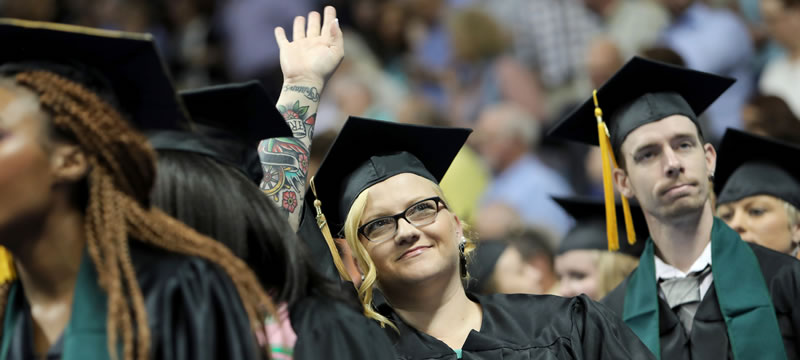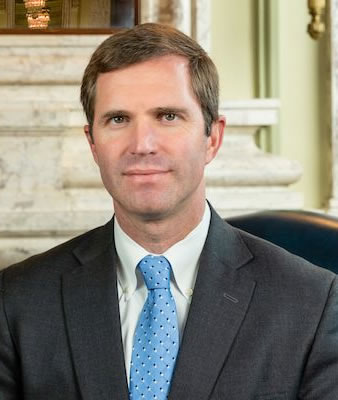Kentucky campuses assisting students down to the "last dollar" with scholarships
February 03, 2021

Even before the economic challenges of COVID-19, more and more Kentucky universities have been turning to "last dollar" scholarships in a bid to ramp up financial aid and help students with the greatest needs continue on to college.
Western Kentucky University, for instance, announced the "Hilltopper Guarantee" in September, pledging to cover 100% tuition for any inbound Kentucky freshman who receives Pell Grant assistance and has a grade point average of 3.0 or higher.
At Eastern Kentucky University, administrators are likewise launching the "Colonel Commitment," a need-based scholarship with a similar aim – paying off any lingering tuition and fees for first-year, Pell-eligible students with good grades.
Murray State University introduced its own version of the "last dollar" model, called the Murray State Promise, two years ago, extending support for first-time freshmen and new transfer students.
And this month, Morehead State University unveiled the Eagle Assurance Scholarship, which targets first-time, full time students who are eligible for Pell Grants, have at least a 2.8 GPA and graduated from a Kentucky high school in 2021.
Such programs are looking to bridge the financial gap for students who have already exhausted other forms of assistance, such as federal and state aid, gifts, grants and scholarships, but still face a balance in their account.
While "last dollar" scholarships aren't new to higher education – Northern Kentucky University has used the model for more than a decade – administrators say they are gaining ground in Kentucky in response to long-standing needs and a growing commitment on campuses to boost affordability.
"This was a priority," said Ethan Logan, vice president for enrollment and student experience at WKU. "We like to think of it as a commitment back to the state that says we are going to do what we can to provide opportunities for Kentucky residents, wherever they are."
Untapped potential
Aaron Thompson, president of the Kentucky Council on Postsecondary Education, said the scholarships are a logical move for most campuses, even if they require some reshuffling of budgets. He said the model helps capture untapped potential across the state and spur on social and economic benefits that far exceed the costs.
"These students have meaningful talent to contribute to our communities and our workforce, and we can't allow financial barriers to overshadow their scholastic abilities," Thompson said. "Campuses understand this implicitly, and that's why we are seeing such bold efforts to expand financial support."

In addition to individual campus efforts, Gov. Andy Beshear is also proposing a $16.4 million dollar program in the next state budget that would provide "last dollar" assistance for nearly 6,300 Kentuckians to complete a certificate, diploma, or associate degree.
Called the Better Kentucky Promise Scholarship, it would expand the current Work Ready Kentucky Scholarship beyond its current focus on the highest demand workforce sectors to include more institutions and programs of study.
Beshear, in an address to the state legislature this month, said the scholarship would create "educational opportunity that is going to move all of us forward."
A growing need
As part of a five-year strategic plan for higher education, CPE is spearheading efforts to make college more affordable for all Kentuckians. The Council has called on campuses to increase funding for need-based financial aid and explore new scholarship models, including free college programs that have been shown to increase enrollment and completion rates in other states.
CPE is also leading initiatives to keep tuition low, improve financial literacy and help students save money by finishing on time.
In Kentucky, the needs are high. The latest research from CPE shows that more than 24,500 low-income students enrolled at public universities in 2018-19. Of those, nearly 5,350 were first-year, full-time students.
The numbers are only expected to grow in the aftermath of COVID-19, and that is already affecting scholarships. Murray State, for example, saw a "significant" increase in utilization between fall 2019 and fall 2020, according to university spokesman Shawn Touney.
Tanlee Wasson, senior vice president for student success, engagement and opportunity at EKU, said 60% of the school's incoming freshmen in fall 2020 were either low-income or first-generation students, "so we know that a huge portion of our incoming population will be eligible for this scholarship."
These students have meaningful talent to contribute to our communities and our workforce, and we can't allow financial barriers to overshadow their scholastic abilities." - CPE President Aaron Thompson
From testing to results
Wasson said the pandemic was not a major driver in unveiling the Colonel Commitment, which takes effect in fall 2021. Instead, EKU began working on the scholarship in 2019, analyzing gaps in the merit-based models and studying outcomes for Pell-eligible students. The university also tested out smaller need-based models that produced compelling results in both enrollment and retention.
Based on those outcomes, EKU's leadership team shifted $1 million in the budget for institutional aid and reworked the merit model to free up funding for more need-based assistance.
"Some of the poorest counties in the nation are in our service region, so we felt that to serve those students well, we needed to cover as much tuition and fees as possible," Wasson said. "This part of the scholarship model is a core mission for EKU."
Like Eastern, WKU began developing the Hilltopper Guarantee before COVID-19 struck this past March, and the scholarship will take effect in fall 2021.
Logan said the guarantee builds on efforts in 2019 to improve access to merit scholarships by basing eligibility on high school GPA rather than test scores. Due to that change and others, close to 84% of first-year students at WKU were eligible for scholarship aid this fall.
Campus leaders viewed the results as evidence that WKU was on the right track in terms of equity and accessibility, Logan said. "It made sense that we could do the guarantee this year, and it was really an important part of the push."
A long-term focus
While the pandemic didn't trigger the decision at WKU, it created uncertainties about timing and the need to balance commitments with revenue. But Logan said fall enrollment was up about 400 students in 2020, offering a sense of fiscal stability.
The Hilltopper Guarantee is expected to assist around 116 students in fall 2021, although the number is not capped. Logan said that even if the numbers were higher next year, the program would still pay dividends if WKU can keep those students enrolled and help them graduate.
Meanwhile, other programs have already proven the resiliency of such scholarships. At Northern Kentucky University for instance, administrators have maintained their scholarship – The Northern Difference – since 2007. This past fall, it helped another 63 students.
Touney, at Murray State, also takes the long view. He points out that the university's first president, Dr. John W. Carr, pledged nearly a century ago that no student would be deprived of education simply due to finances.
"Through initiatives such as the Murray State Promise, we follow through on this commitment," Touney said.
Last Updated: 7/23/2021
